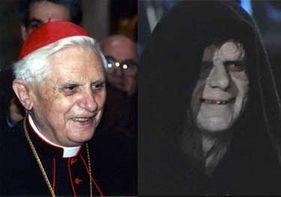BODY

Tasteless, I know. And certainly precedented. But the observation isn’t so utterly stripped of truth so as to be pointless, or so recited as to be tired. And for that matter, if I ceded the option of satire, now I wouldn’t be much fun at all, would I?
I don’t think Pope Benedict is Satan, or even a power hungry monster who shoots lightning from his fingers. I do have strong reservations about his judgment. I also have reservations about the collective judgment of the leadership of the Catholic church, and while I’ve grumbled about this here and there, I want to open a discussion, or at least outline for myself, what I call problems with the the Church’s stance on issues such as the sharing of communion, the ordination of women, the status of minorities of faith, the role of the laity, and ecumenism. These are, broadly speaking, the areas in which my position differs from that the official stance of the Catholic church. I am allowed to do so according to an interpretation of the catechism that insists upon the rule of conscience. Admittedly, (ironically?) there are contrary interpretations, often deferring to the emphasis that Church teaching is supposed to play in the formation of conscience. In fact, faithful dissent is probably as close to a dividing line issue between “conservative” and “liberal” Catholics (not always analogous to the political terms) as someone is likely to find. I’ll get into this in a minute.
Essentially, though, before I sound off at length on say, the ordination of women, I should explain why it is not sinful or even objectionable that I should do so… as according to Church doctrine.
* * * * *
Of a number of objections to the principle of faithful dissent, the most cogent and logical is that:
1) Given an admission that the Church’s authority and teachings are legitimate, and
2) Given the acknowledgment that our understanding of doctrine as scripturally inspired develops over time, and
3) Given that the faithful, individually, are expected to conform to Church teachings,
the whole idea of faithful dissent is completely dependent upon a specific interpretation of the role of conscience in the catechism.
In other words, this is your standard “house of cards” argument. I am relying on the catechism’s definition of “conscience” to justify my dissent from teaching I am supposed to accept. If I am wrongly interpreting that definition, than I am wrongly asserting my right to dissent. These statements are correct.
The problem with the “house of cards” is that it assumes the definition of conscience to be elusive and vague. Rather, masterfully stated in the catechism, concience is precisely evoked as:
1) the divine origin of human morality and ethical initiative, that is, our conscience,
2) our basic obligation to respond to morality.
∙ · ∙
Interestingly, I recently encountered an argument frequently posed against Christianity that follows a similar line. This argument is that Christianity is a house of cards entirely built upon the premise of original sin. While Adam and Eve committed a sin against God by eating the apple, this sin was theirs, and there is nothing in the old testament to suggest that this sin was in any way hereditary. If humans sin individually rather than being born into sin, than there is no need for a Redeemer to expiate the eating of the apple.
This is, honestly, a stronger argument than that posed against faithful dissent, because far from ambiguous, the Bible gives us an account of Adam and Eve’s fall from grace but offers only a very spare interpretation, that could be read either way. This doesn’t trouble me; it is an argument that I respond to with faith as opposed to reason. There is no logical flaw in either my acceptance of the doctrine of original sin, or others’ refutation. But it does affect things somewhat, no?
∙ · ∙
The centrality of conscience doesn’t relegate the whole principle of faithful dissent to a “house of cards” any more than the fact that Genesis doesn’t cite “original sin” invalidates its presence, and this I can argue on both the force of faith and the power of reason. A house has to have a foundation, right? Conscience is closer to a cornerstone than a card. My line, then, will be to analyze the definition and role of conscience as outline in the catechism, and extrapolate upon it as discussed by the Conference of American Bishops.
Let me know what you think.
To Be Continued…